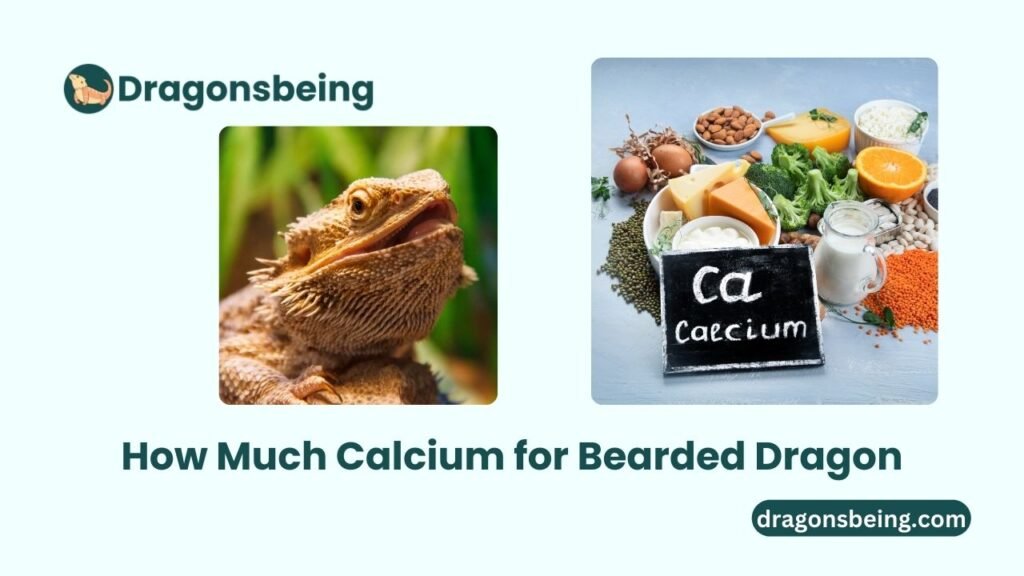Bearded dragons need about 0.5 to 1 gram of calcium per kilogram of body weight weekly. This amount can vary based on age, diet, and health.
Calcium is essential for bearded dragons to maintain strong bones and overall health. A calcium deficiency can lead to serious health issues, such as metabolic bone disease. Young bearded dragons require more calcium due to their rapid growth. Adult dragons need less but still require regular calcium supplementation.
Offering a balanced diet rich in leafy greens, insects, and occasional supplements helps ensure adequate calcium intake. Observing your dragon’s behavior and health can guide necessary adjustments to their diet. Providing proper UVB lighting also plays a crucial role in calcium metabolism, making it vital for their well-being.
Calcium Needs For Bearded Dragons
Understanding the calcium needs of bearded dragons is crucial. These reptiles require calcium for strong bones and overall health. A calcium deficiency can lead to serious health issues.
Why Calcium Is Vital
Calcium plays several important roles in a bearded dragon’s life:
- Bone Health: Calcium strengthens bones and prevents fractures.
- Muscle Function: It helps muscles contract and relax.
- Nerve Function: Calcium aids in transmitting nerve signals.
- Metabolism: It supports various metabolic processes.
Without enough calcium, bearded dragons may suffer from metabolic bone disease (MBD). MBD can cause pain, deformities, and even death.
Recommended Calcium Intake
Bearded dragons need different amounts of calcium at various life stages. Below is a simple table to guide you:
| Age | Calcium Intake |
|---|---|
| Hatchlings (0-3 months) | 0.5-1.0% of diet |
| Juveniles (3-12 months) | 1.0-1.5% of diet |
| Adults (1 year+) | 1.5-2.0% of diet |
Dusting food with calcium powder is an effective way to meet these needs. Offering calcium-rich foods also helps.
Calcium-Rich Food Options
Provide your bearded dragon with these calcium-rich foods:
- Collard Greens: High in calcium.
- Mustard Greens: Another excellent source.
- Turnip Greens: Nutrient-dense option.
- Squash: Safe and healthy choice.
Always ensure fresh, clean water is available. Monitor their health regularly. Consult a vet if you notice any signs of deficiency.
Understanding Your Bearded Dragon
Understanding your bearded dragon’s needs is crucial for their health. Calcium is vital for their growth and well-being. Providing the right amount helps prevent serious health issues.
Age And Calcium
Bearded dragons have different calcium needs based on their age. Here’s a quick overview:
| Age Group | Calcium Intake |
|---|---|
| Hatchlings (0-3 months) | 0.3-0.5 grams per day |
| Juveniles (3-12 months) | 0.5-1.0 grams per day |
| Adults (1 year and older) | 1.0-2.0 grams per day |
These amounts ensure healthy bone development and overall growth. Adjust calcium intake based on their diet and activity levels.
Signs Of Calcium Deficiency
Recognizing signs of calcium deficiency is important. Watch for these symptoms:
- Weakness: Lack of energy or difficulty moving.
- Soft bones: Bones may appear bent or deformed.
- Twitching: Muscle spasms can occur.
- Loss of appetite: They may refuse to eat.
- Behavior changes: Increased hiding or lethargy.
Addressing these signs quickly can prevent severe health problems. Regular vet check-ups help monitor calcium levels. Ensure a balanced diet rich in calcium for optimal health.
Sources Of Calcium
Calcium is vital for the health of your bearded dragon. It supports bone development and prevents metabolic bone disease. Finding the right sources of calcium is essential for their diet.
Natural Sources
Feeding your bearded dragon natural foods is a great way to provide calcium. Here are some top choices:
- Dark Leafy Greens: Collard greens, kale, and mustard greens.
- Vegetables: Squash, bell peppers, and broccoli.
- Fruits: Blackberries, raspberries, and figs.
- Insects: Crickets and mealworms are rich in calcium.
Always wash and chop the vegetables and fruits before serving. This makes them easier to eat and digest.
Supplements And Powders
Sometimes natural sources aren’t enough. Calcium supplements can help fill the gap. Here are some options:
| Type of Supplement | Calcium Content | Usage |
|---|---|---|
| Calcium Powder | High | Sprinkle on food 2-3 times a week |
| Calcium with D3 | Very High | Use once a week |
| Liquid Calcium | Moderate | Add to water or food |
Choose high-quality supplements. Check for calcium and vitamin D3 content. This ensures your bearded dragon gets the necessary nutrients.
Balancing Calcium With Other Nutrients
Bearded dragons need a balanced diet. Calcium plays a vital role in their growth and health. However, calcium must work with other nutrients like phosphorus and vitamin D3. Understanding this balance helps pet owners provide the best care.
The Calcium To Phosphorus Ratio
The ideal calcium to phosphorus ratio is crucial. A good ratio is 2:1. This means there should be twice as much calcium as phosphorus in their diet. Too much phosphorus can block calcium absorption. This can lead to health issues.
| Food Item | Calcium (%) | Phosphorus (%) | Ratio (Ca:P) |
|---|---|---|---|
| Collard Greens | 1.9 | 0.2 | 9.5:1 |
| Mustard Greens | 1.5 | 0.3 | 5:1 |
| Carrots | 0.5 | 0.1 | 5:1 |
| Crickets | 0.5 | 0.5 | 1:1 |
Feed your bearded dragon foods that match this ratio. This helps support their skeletal health and overall well-being.
Vitamin D3 And Calcium Absorption
Vitamin D3 is essential for calcium absorption. Without it, calcium won’t be effectively utilized. Bearded dragons can get vitamin D3 from sunlight or supplements.
- Provide 10-12 hours of UVB light daily.
- Use a high-quality UVB bulb.
- Consider vitamin D3 supplements if needed.
Always monitor your bearded dragon’s health. Adjust their diet based on their needs. Proper balance ensures a happy and healthy pet.
Feeding Practices For Optimal Health
Feeding your bearded dragon properly is vital for their health. Calcium plays a key role in their growth and bone strength. Understanding how to provide the right amount of calcium ensures a longer, healthier life for your pet.
Dietary Tips
Providing a balanced diet is crucial for your bearded dragon. Focus on a mix of greens, insects, and calcium-rich foods.
- Greens: Offer leafy greens like collard greens and kale.
- Insects: Feed crickets, mealworms, and dubia roaches.
- Fruits: Treat them with small amounts of fruit like strawberries.
Incorporate calcium-rich foods at least three times a week. Use a calcium powder supplement with no vitamin D3 for regular feeding.
Avoiding Over-supplementation
Too much calcium can harm your bearded dragon. Follow these guidelines to prevent over-supplementation:
- Use calcium supplements sparingly.
- Monitor your dragon’s weight and health regularly.
- Consult a vet for specific dosage recommendations.
Signs of over-supplementation include:
- Weakness
- Constipation
- Abnormal behavior
Always balance calcium with phosphorus. A ratio of 2:1 is ideal for optimal health.
| Food Type | Calcium Content |
|---|---|
| Collard Greens | 200 mg/100g |
| Crickets | 50 mg/100g |
| Mealworms | 30 mg/100g |
Follow these practices for a healthy, happy bearded dragon.
Monitoring And Adjusting Calcium Levels
Calcium is vital for your bearded dragon’s health. Tracking calcium levels helps prevent health issues. Make adjustments as needed to ensure optimal health.
Regular Health Check-ups
Routine vet visits are essential for your bearded dragon. Health check-ups help monitor calcium levels. Here are some key points to consider:
- Schedule check-ups every 6 to 12 months.
- Discuss diet and supplementation with your vet.
- Request blood tests to check calcium levels.
Regular check-ups catch problems early. They ensure your bearded dragon stays healthy.
Signs You’re Getting It Right
Monitoring calcium levels means watching for signs of health. Here are signs that indicate you are doing well:
| Sign | Description |
|---|---|
| Active Behavior | Your dragon moves around happily. |
| Healthy Shedding | Skin sheds smoothly without issues. |
| Good Appetite | Willing to eat a variety of foods. |
| Strong Bones | No signs of weakness or fractures. |
Notice these signs? You are likely providing the right calcium levels. Regular monitoring leads to a healthy and vibrant bearded dragon.
Common Mistakes To Avoid
Bearded dragons require careful calcium management. Mistakes can lead to serious health problems. Learn about common mistakes to avoid.
Overlooking Symptoms Of Deficiency
Recognizing signs of calcium deficiency is crucial. Common symptoms include:
- Weak bones: Look for soft or deformed limbs.
- Muscle twitching: Watch for unusual movements.
- Lethargy: Notice if your dragon is less active.
- Loss of appetite: Check if it eats less than usual.
Ignoring these signs can lead to severe health issues. Regular check-ups with a vet help catch problems early.
Mismanagement Of Supplements
Proper use of calcium supplements is essential. Common errors include:
- Over-supplementation: Too much calcium can cause problems.
- Inconsistent dosing: Stick to a regular schedule.
- Ignoring UVB exposure: UVB helps calcium absorption.
Use a calcium supplement designed for reptiles. Follow the manufacturer’s guidelines for dosage. Balance is key to your bearded dragon’s health.
| Supplement Type | When to Use | Frequency |
|---|---|---|
| Calcium without D3 | Regularly for everyday needs | 3-4 times a week |
| Calcium with D3 | When UVB light is limited | Once a week |
Understanding these mistakes ensures your bearded dragon stays healthy. Always monitor calcium intake and seek help from a vet if unsure.
Creating A Balanced Diet
Feeding a bearded dragon requires careful planning. A balanced diet is crucial for their health. Calcium plays a significant role in their growth and bone strength. Proper calcium intake helps prevent metabolic bone disease. Aim for a variety of food to meet all their needs.
Incorporating Variety
Variety keeps meals interesting for your bearded dragon. Different foods provide essential nutrients. Include both insects and vegetables in their diet. Here are some food options:
| Food Type | Examples | Frequency |
|---|---|---|
| Insects | Crickets, Mealworms, Dubia Roaches | 3-5 times a week |
| Vegetables | Collard Greens, Squash, Carrots | Daily |
| Fruits | Strawberries, Blueberries, Apples | Occasionally |
Mixing different foods helps provide balanced nutrition. Avoid feeding only one type of food. Monitor their reactions to new foods. This will ensure they enjoy a variety of tastes.
Scheduled Feeding Times
Consistency helps your bearded dragon thrive. Establish a feeding schedule. Be consistent with portion sizes and food types. Here’s a simple feeding schedule:
- Morning: Offer insects.
- Noon: Provide fresh vegetables.
- Evening: Add a small fruit treat.
Adjust the schedule as your dragon grows. Regular feeding times support better digestion. Always remove uneaten food after a few hours. This keeps the habitat clean and healthy.
Tracking your dragon’s eating habits helps identify any issues. A balanced diet leads to a happy and healthy bearded dragon.
Additional Care Tips
Proper care for bearded dragons involves more than just calcium. Consider their hydration, handling, and environment.
Hydration And Health
Hydration is crucial for your bearded dragon’s health. Here are some tips:
- Provide fresh water daily in a shallow dish.
- Use misting to increase humidity in the enclosure.
- Soak your dragon in shallow, warm water weekly.
Signs of dehydration include:
- Sunken eyes
- Dry skin
- Lethargy
Ensure your dragon stays hydrated. This supports digestion and overall health.
Safe Handling And Environment
Handling your bearded dragon safely is essential. Follow these guidelines:
- Always wash your hands before handling.
- Support the body with both hands.
- Avoid sudden movements to prevent stress.
Your dragon’s environment impacts its well-being. Consider these factors:
| Environmental Factor | Recommendation |
|---|---|
| Temperature | Maintain a basking area at 95°F-110°F. |
| Lighting | Provide UVB lighting for 10-12 hours daily. |
| Space | Ensure a spacious enclosure (at least 40 gallons). |
A clean environment prevents illness. Regularly clean the tank and change substrate.
Follow these tips for a happy, healthy bearded dragon.
Frequently Asked Questions
How Much Calcium Do Bearded Dragons Need?
Bearded dragons require about 0. 5 to 1 gram of calcium per kg of body weight weekly.
What Is The Best Calcium Source?
Calcium powder, leafy greens, and calcium-rich insects are excellent sources for your bearded dragon.
How Often Should I Supplement Calcium?
Calcium supplements should be provided 2-3 times a week, depending on your dragon’s age and diet.
Can Bearded Dragons Get Calcium From Food?
Yes, they can obtain calcium from leafy greens, insects, and commercial foods designed for reptiles.
What Happens If They Get Too Much Calcium?
Excessive calcium can lead to metabolic bone disease and other health issues, so moderation is key.
At What Age Should I Start Calcium Supplements?
Begin calcium supplementation when your bearded dragon is around 6 weeks old to support healthy growth.
Conclusion
Providing the right amount of calcium for your bearded dragon is essential for their health. Aim for a balanced diet rich in calcium sources. Regular supplementation will help prevent metabolic bone disease. Always monitor your pet’s behavior and health. A happy, healthy bearded dragon thrives with proper care and nutrition.

Hi, I’m Dr. Michelle Mayers, a veterinary professional with a deep passion for animal health and well-being. Over the years, I’ve dedicated my life to caring for animals and helping pet owners better understand their furry, feathered, or scaly companions. On my blog, Dragonsbeing, I share insights, tips, and stories that aim to educate, inspire, and connect with fellow animal lovers. Join me at Dragonsbeing as we explore the fascinating world of veterinary care and celebrate the special bond between humans and animals!


